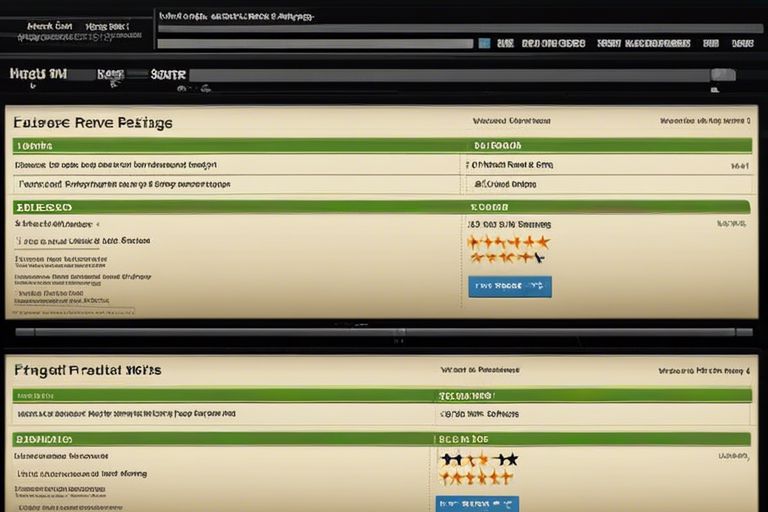Pertaining to standing out in the competitive world of online search results, ratings play a crucial role. Google considers various factors to determine the ranking of a website, and ratings not only boost credibility but also impact your SERP position significantly. In this blog post, we will examine into the importance of ratings in improving your Google ranking and how you can leverage them to enhance your online visibility. To learn more about the correlation between ratings and SERP position, visit Improve Your SERP Position: Why Google Ranking Matters.
Key Takeaways:
- Quality ratings can boost your SERP position: High quality ratings and positive reviews from customers can significantly improve your search engine ranking.
- Utilise structured data for ratings: Implement structured data markup on your website to provide search engines with detailed information about your ratings, helping them to display rich snippets in search results.
- Encourage customer reviews: Actively encourage your customers to leave reviews and ratings on your website or review platforms to enhance your online reputation and increase your chances of ranking higher in search results.
Understanding SERP Dynamics
In the matter of improving your search engine results page (SERP) position, understanding the dynamics of SERP is crucial. SERP refers to the page that appears when you search for something on a search engine like Google. It includes a list of websites relevant to your search query, ranked according to various factors.
How Search Engines Rank Pages
Search engines use complex algorithms to determine the ranking of web pages in SERP. While the exact algorithms are kept confidential by search engines like Google, we know that factors such as keywords relevance, backlinks, page speed, and user experience play a significant role. Pages that are deemed most relevant and valuable to users are ranked higher in SERP.
User experience metrics are crucial in determining how search engines rank pages. Metrics such as click-through rate (CTR), bounce rate, and dwell time provide search engines with insights into how users interact with a website. Pages with high CTR, low bounce rate, and longer dwell time are seen as more valuable by search engines and are likely to rank higher in SERP.
The Role of User Experience Metrics
User experience metrics, such as click-through rate (CTR), bounce rate, and dwell time, provide valuable insights into how users engage with a website. These metrics help search engines evaluate the effectiveness and relevance of a web page to users. Pages that offer a positive user experience are more likely to be rewarded with higher rankings in SERP.
Ratings: The Game Changer
Ratings play a crucial role in determining your Search Engine Results Page (SERP) position. They have the power to significantly impact your website’s visibility and credibility. Understanding how ratings influence your SERP ranking is key to improving your online presence.
Types of Ratings That Affect SERP
With respect to SEO ratings, there are several key types that can influence your SERP position. These include star ratings, customer reviews, product ratings, service ratings, and overall ratings. Each of these ratings provides search engines with valuable information about the quality and trustworthiness of your website. So, it’s important to pay attention to all these aspects when aiming to boost your SERP performance. Assume that search engines favour websites with high ratings when displaying search results.
| Star Ratings | Customer Reviews |
| Product Ratings | Service Ratings |
| Overall Ratings |
Methods for Gathering and Displaying Ratings
Utilising structured data markup is a highly effective method for gathering and displaying ratings on your website. This not only helps search engines understand your content better but also enhances the appearance of your listings in search results. Additionally, actively encouraging customers to leave reviews and ratings can significantly impact your SERP position. By engaging with your audience and showcasing their feedback, you can build trust and credibility with both users and search engines.
Another important aspect of methods for gathering and displaying ratings is the implementation of rich snippets. These snippets provide a preview of the ratings and reviews directly on the search results page, giving users quick insights into the quality of your website. By making good use of these methods, you can enhance your online visibility and attract more organic traffic. Assume that incorporating rich snippets can lead to a higher click-through rate and improved SERP performance.
Strategies to Leverage Ratings for SERP Improvement
Encouraging Customer Reviews and Ratings
One of the most effective ways to improve your Search Engine Results Page (SERP) position is by encouraging customer reviews and ratings. Happy customers are more likely to leave positive feedback, which can help boost your online reputation and credibility. This, in turn, can significantly impact your search ranking.
Make it easy for customers to leave reviews by setting up review prompts on your website or sending follow-up emails after a purchase. You can also offer incentives such as discounts or rewards for leaving feedback, but always ensure that the process is transparent and genuine to avoid any penalties from search engines.
Integrating Ratings with Your SEO Campaign
Integrating ratings from customer reviews into your Search Engine Optimization (SEO) campaign can further enhance your SERP position. Adding structured data markup to your website can help search engines understand and display your ratings in the search results, making your listing more appealing to users.
By incorporating keywords from reviews into your SEO strategy, you can also increase the relevance and visibility of your content. This synergy between ratings and SEO can have a powerful impact on your online presence and ultimately improve your chances of ranking higher on search engine results pages.
Monitoring and Responding to Ratings
Monitoring and responding to ratings is crucial for improving your Search Engine Results Page (SERP) position. Engaging with customer feedback shows search engines that you care about your customers’ experiences, which can positively impact your website’s ranking. Keeping an eye on your ratings also allows you to identify areas for improvement and address any negative feedback promptly.
Tools for Tracking Your Ratings and SERP Position
There are various tools available to help you monitor your ratings and SERP position effectively. Tools like Google Search Console and Google Analytics can provide valuable insights into how your website is performing in search results. Additionally, platforms like Yelp and Trustpilot offer tools specifically designed for tracking and managing customer ratings.
Best Practices for Managing Ratings
Pertaining to managing ratings, it’s necessary to respond to all reviews, whether positive or negative. Thanking customers for their positive feedback shows appreciation and encourages loyalty, while addressing negative feedback demonstrates that you are committed to improving customer satisfaction. It’s also important to monitor trends in your ratings over time to spot areas of concern before they escalate.
By implementing a proactive approach to managing ratings, you can build trust with your audience and enhance your online reputation. Remember that consistency is key in responding to ratings, and always strive to provide excellent customer service to boost your SERP position.
The Secret to Improving Your SERP Position with Ratings
Optimising your website with ratings and reviews can significantly boost your Search Engine Results Page (SERP) position. By encouraging positive feedback from customers, you not only enhance your credibility but also increase your chances of appearing higher in search rankings. Providing quality products or services and engaging with your audience to collect genuine reviews are key to improving your online reputation and ultimately your SERP ranking. Embracing this strategy can give your business a competitive edge and establish trust with potential customers, leading to increased traffic and conversions. Make ratings an integral part of your digital marketing efforts to elevate your online visibility and stand out in the crowded digital landscape.
FAQ
Q: What is the significance of Ratings in improving SERP position?
A: Ratings play a crucial role in improving your website’s SERP position by enhancing credibility and trustworthiness in the eyes of search engines and users.
Q: How do Ratings impact SEO?
A: Ratings have a direct impact on SEO as search engines consider them as a strong ranking signal, leading to improved visibility and higher click-through rates.
Q: What are the types of Ratings that can boost SERP position?
A: Ratings such as customer reviews, star ratings, and testimonials can significantly boost your website’s SERP position and overall organic traffic.
Q: How can businesses leverage Ratings to enhance their online presence?
A: Businesses can leverage Ratings by actively collecting and displaying customer feedback, responding to reviews, and implementing structured data markup to stand out in search results.
Q: What strategies can be employed to improve Ratings and SERP position simultaneously?
A: To improve Ratings and SERP position simultaneously, businesses should focus on delivering exceptional customer experiences, encouraging satisfied customers to leave reviews, and monitoring feedback to address any issues promptly.




